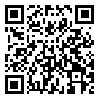مجله رویش روانشناسی از دادن گواهیهای کاغذی معذور است. لطفا تقاضا نکنید. همه گواهی ها در صفحه شخصی کاربران موجود است.
year 14, Issue 1 (Spring 2025 2025)
Rooyesh 2025, 14(1): 155-164 |
Back to browse issues page
Download citation:
BibTeX | RIS | EndNote | Medlars | ProCite | Reference Manager | RefWorks
Send citation to:



BibTeX | RIS | EndNote | Medlars | ProCite | Reference Manager | RefWorks
Send citation to:
Asgari N, Aligohari B. (2025). The effectiveness of paradoxical scheduling on psychological resilience and flexibility in women affected by infidelity. Rooyesh. 14(1), 155-164.
URL: http://frooyesh.ir/article-1-6036-en.html
URL: http://frooyesh.ir/article-1-6036-en.html
1- M.A. student in General psychology, Department of Psychology, Roudehen Branch, Islamic Azad University, Roudehen, Iran.
2- Assistant Professor, Department of Psychology, Roudehen Branch, Islamic Azad University, Roudehen, Iran. ,gohari.behzad@gmail.com
2- Assistant Professor, Department of Psychology, Roudehen Branch, Islamic Azad University, Roudehen, Iran. ,
Abstract: (1138 Views)
The present study aimed to determine the effectiveness of paradoxical scheduling on psychological resilience and flexibility in women affected by infidelity. The research method was quasi-experimental with a pre-test-post-test design with a control group. The statistical population of the present study consisted of all women affected by infidelity from their husbands who referred to counseling centers located in District 1 of Tehran from October to March 2025, of which 30 people, 15 in the control group and 15 in the experimental group, were selected through purposive sampling and randomly placed in two groups. To collect data, Dennis & Vander Wal's Cognitive Flexibility Questionnaire (CFI, 2010), Conner-Davidson Resilience Scale (CD-RISC, 2003) were used, and paradoxical therapy intervention was implemented in four two-hour sessions, once a week, in a group setting for the experimental group. A multivariate covariance test was used to analyze the data. The study's findings showed that by controlling the pre-test effect, there was a significant difference at the 0.05 level between the mean of the post-test of resilience and psychological flexibility in the two experimental and control groups. As a result, paradox therapy can be considered an effective intervention for women affected by infidelity.
Type of Article: Research |
Subject:
General Psychology
Received: 2025/02/12 | Accepted: 2025/02/22 | ePublished: 2025/04/22
Received: 2025/02/12 | Accepted: 2025/02/22 | ePublished: 2025/04/22
Send email to the article author
| Rights and permissions | |
 |
This work is licensed under a Creative Commons Attribution-NonCommercial 4.0 International License. |





